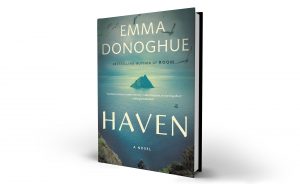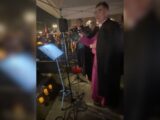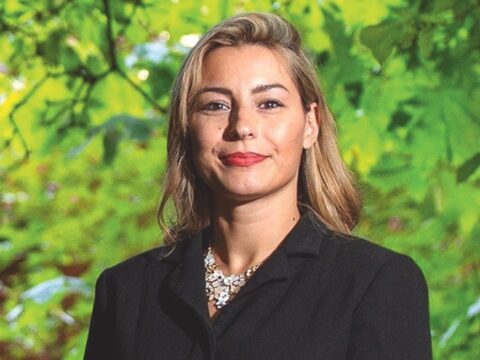Emma Donoghue has a penchant for writing about people living in extreme isolation. Her latest book, Haven, tells the story of three Irish monks who start a monastic community on a desolate island — and it bears familiar traces of her 2010 hit novel, Room, about a mother and son kept in captivity by their abuser in an underground bunker. Unlike Room’s claustrophobic, subterranean world, the setting of Haven is the expansive and legendary Skellig Michael, a mountainous island off the southwest coast of Ireland. Inspired by Skellig Michael’s seventh-century ruins — several monks’ cells, an oratory and a graveyard — Donoghue invented three fictional monks to populate the island’s iconic terrain.
Haven is slow-paced and contemplative, like the monastic life that Donoghue is depicting. Instead of conventional chapters, the novel is divided into longer sections named for the labours the monks undertake as they struggle for survival on the island’s inhospitable peaks. In a section titled “The Cross,” an older monk, Brother Cormac, carves a freestanding cross from a stone pillar to claim the island for Christ, while in “Hatching Season,” the younger monk, Brother Trian, searches the island’s nests for eggs and birds for sustenance. Cormac and Trian are directed in their labours by Artt, the stern and demanding prior who leads their tiny community.
You may unsubscribe from any of our newsletters at any time.
Donoghue excels in her observations of the seemingly insignificant. In a book focusing on only three characters — and three characters for whom silence is a virtue — the few, brief moments of conversation are weighted with import and tension. Artt, Cormac and Trian are not easy companions, and Donoghue’s dialogue shows the fragility of trust among the three men as they argue about how to preserve their lives while cut off from outside help. Also evident, though, is the love the monks have for one another, in subtle scenes of fraternal charity and service: Artt humbly cleaning a cut on Cormac’s leg; Cormac tending to Trian when the latter is struck down by sickness.

Haven is a story of these trials and blessings of human weakness. In the precarity of life on Skellig Michael, the three men must learn to lean on one another and God. The island itself emerges as a character in relationship with the monks who have made it their home; it provides for their survival but also manifests the divine presence to them.
More on Broadview:
- Halal Bae wants to shift perceptions of what drag can be
- In ‘Rehearsals for Living,’ two writers envision a path to a more just future
- ‘Hallelujah’ and Leonard Cohen’s personal mythology of betrayal and forgiveness
Donoghue presents Skellig Michael’s harsh beauty as an invitation to greater spiritual awareness, imagining the island through Trian’s youthful, optimistic gaze: “The book of the earth has enigmatic passages that Trian can’t interpret, but still he loves to read it. It seems to him that nature is God’s holiest language. Everything created seems to express its Creator; everything cries out, ‘You made me.’”
Donoghue’s Haven is similarly a creative cry of triumph: a tender depiction of the existence of profound suffering alongside profound love, and a rejoicing in the hope to be found in human interdependence, even in one of the bleakest places on Earth.
***
Marie Trotter is a writer and PhD student in Montreal.
This review first appeared in Broadview’s October/November 2022 issue with the title “Finding solace in survival.”














